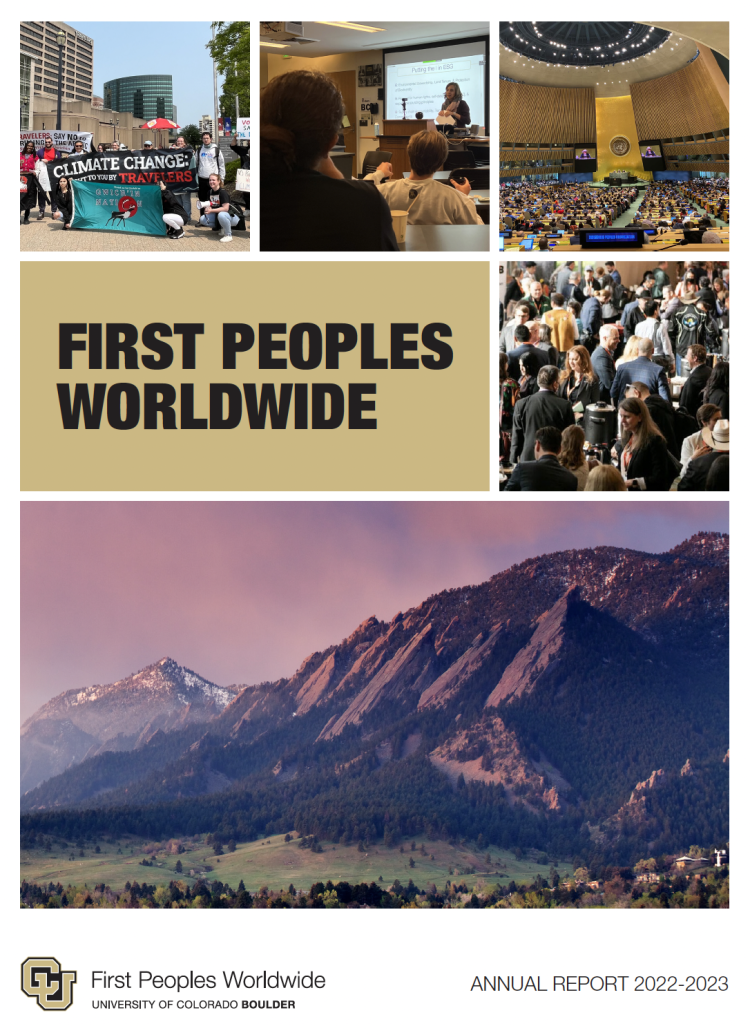First Peoples Worldwide 2022-2023 Annual Report

First Peoples Worldwide 2023 Annual Report encompasses projects and achievements from July 2022 through June 2023 and highlights First Peoples' work to support Indigenous leaders in shareholder advocacy and build the business case for the rights of Indigenous Peoples, including the right to free, prior and informed consent (FPIC).
MESSAGE FROM FIRST PEOPLES WORLDWIDE EXECUTIVE DIRECTOR
Dear Friends:
It is with gratitude that I present our third Annual Report. The systemic economic and environmental shifts I have written about for the past two years are still occurring, and we are finding much opportunity in this transition moment. Our work to center Indigenous Peoples in shareholder advocacy and to uplift new economic ways of being holds steady as we continue to connect, convene, and center Indigenous leaders.
We witnessed first-hand as Indigenous power to activate shareholder advocacy grew this year. First Peoples Worldwide partnered and strategized with Indigenous leaders and investor advocates to put forward proposals in the finance, insurance, and energy sectors. Most proposals, whether withdrawn or not, opened new space for direct dialogue between concerned Indigenous leaders and companies. While the politicization of ESG in the U.S. continued, many of the resolutions centering free, prior and informed consent (FPIC) and Indigenous Peoples received the necessary votes to return in 2024. Our strategy for next season is already underway with the formation of a new IIPWG working group to accelerate standards in corporate disclosure and reporting as to Indigenous Peoples.
When viewing the global business and Indigenous Peoples’ rights landscape, it excites me to see more and more Indigenous Peoples produce FPIC protocols to proactively address outside entities. I can now state affirmatively to companies that their first question during due diligence must be whether the affected Indigenous Peoples already have protocols for their FPIC from which the engagement should proceed. This is a powerful shift.
Company capacity to understand and incorporate Indigenous Rights Risk into their operations grew as measured by the number of commitments and new policies on Indigenous Peoples published after dialogue and training this year. In support of the Lead the Charge Campaign, which found Indigenous rights was the least screened criteria in electrical vehicle supply chains, we began engaging directly with automakers. What is most evident: while there is precedent for Indigenous Rights Risk due diligence in the mining sector, there is a nascent and critical opportunity for enduser companies to understand and address their impacts on Indigenous Peoples.
All of this data shows us that the moment for hard work to disrupt past patterns of engagement is now. The opportunity to embed new models for companies to screen for Indigenous Rights Risk (IRR) in the green economy must happen during the energy and economic transition occurring right now
This is the moment to telegraph the keystone importance of FPIC as a mechanism to safeguard and prioritize Indigenous Peoples’ right to self-determination. This is the moment to demonstrate the necessity of–and respect for–Indigenous Peoples’ experiences and priorities as critical data for a world with evershifting economic and environmental challenges. Now is the moment for catalytic partnerships between investors and Indigenous Peoples to embed these new standards as assumptions in economic models.
In the past year, we forwarded this work through our core programs. In brief, with partners from Cultural Survival, Batani Fund, Earthworks and Society for Threatened Peoples, First Peoples formally launched the Securing Indigenous Peoples’ Rights in the Green Economy (SIRGE) Coalition to address the impact on Indigenous Peoples related to increasing global demand for minerals used to produce renewable energy. We supported investors through hosting several Indigenous-led conversations on FPIC, showcasing Indigenous leaders from around the world, and we connected Indigenous leaders and investors at the United Nations Conference of the Parties on the Convention on Biological Diversity (COP15) in Montreal. With numerous corporate standards being developed or in the process of revision, First Peoples worked with partners to integrate Indigenous Peoples’ rights into frameworks such as the International Sustainability Standards Board (ISSB), Global Reporting Initiative (GRI), and the Taskforce on Nature-related Financial Disclosures (TNFD), among others.
First Peoples also published two significant papers this year. Supply Chains and Sovereignty compiled data from Indigenous-led solutions in food supply chain disparities in the U.S., and Indigenizing Catalytic Capital shed light on ways to partner with Native entrepreneurs to steward innovative solutions and businesses from start to completion through patient, catalytic, and values-driven capital.
Finally, First Peoples experienced significant growth–in size, funding, and impact this year. As of this writing, I’m pleased to share that our team has more than doubled. Their tremendous talent and expertise support all areas of our work.
When we were established in 1997, First Peoples Worldwide was the first organization to center corporate consideration and respect for the rights of Indigenous Peoples in business practice. Today, First Peoples’ expertise is recognized globally for advancement of Indigenous Peoples’ rights through shareholder advocacy and building relationships between Indigenous leaders and investors.
With your support, we have accomplished everything showcased in this report, and we will accomplish more in the years ahead given the explosion of creativity, connection, and opportunity our expanded team demonstrates.
Sincerely,
Kate R. Finn
Exectuive Director, First Peoples Worldwide

